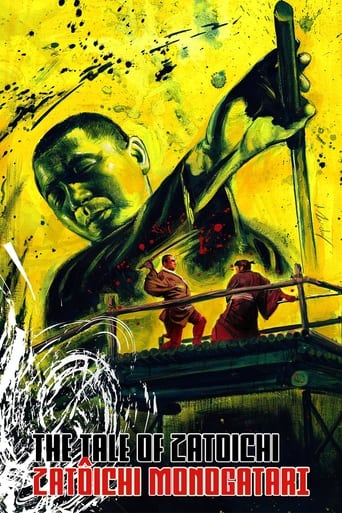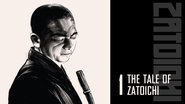WILLIAM FLANIGAN
THE TALE OF ZATOICHI / THE LIFE AND OPINIONS OF MASSEUR ICHI / ZATÔICHI 1 (ZATÔICHI MONOGATARI). Viewed on Streaming. Restoration/ preservation = nine (9) stars; cinematography = seven (7) stars; set design = six (6) stars; choreography = two (2) stars. Think you've seen every flavor of Japanese movie sword swinger? How about a self-taught amateur who is also blind? And very deadly! Director Kenji Misumi deploys Tokugawa Period Yakuza-gang warfare as a backdrop for a fascinating personality analysis of a masseur turned wandering master of swordplay whose sightless handicap is more of an advantage than a disability. (Perhaps with the help of a little magic?) Misumi's photo-play provides more talk than action and seems to have been adapted from a stage play (or the script writers learned their craft in the live theater?). Interestingly, ancient Yakuza gangs closely resemble those depicted in contemporary films (instead of not being able to shoot straight, they are unable to slash straight and rely on hired swords (usually unemployed samurai)! Acting is consistently good despite terrible choreography. Characters often only have to waive their wooden swords at stunt actors to get them to fall over (the dialog tries to cover this obvious short coming by repeating lines that say sword play is too fast to be seen!). Sound-stage "exteriors" look and sound phony. Cinematography (2.35 : 1, black & white) is mostly well done especially the interior dolly shots. Not so much for panning which serves mainly to induce horizontal vertigo in the viewer wide-screen formats and rapid pans don't play well together!). Subtitles are close enough for Kansei-Ben deliveries. Restoration/preservation is good. Adult make-believe fun. WILLIAM FLANIGAN, PhD.
rodrig58
A simple and very good movie. A movie about honor in the raw world of samurai. Shintarô Katsu plays a special role in the main role, Zatoichi. Masayo Banri is more than convincing in the role of the sister of a coward, the woman who falls in love with Zatoichi. Shigeru Amachi is also good in the role of Hirate. Good Japanese movies have something special comparing to the rest of the world, they have a very special magical atmosphere. This is one of them.
Brandt Sponseller
Zatoichi (Shintaro Katsu) is a blind masseuse (masseuse was a traditional occupation for the blind in Japan) who took up sword fighting to gain more respect ("Zato" is actually a title--"Ichi" was his name; "Zato" was the lowest title in the traditional guild for the blind). He quickly mastered the art--far surpassing the average sword fighter and even the average samurai--as he seems to have a sixth sense. This film has Zatoichi visiting Sukegoro (Eijiro Yanagi) of Iioka, to "cash in" on some owed hospitality. He begins by slightly conning Sukegoro's gang in a gambling game involving dice. Shortly afterward, he learns that Sukegoro's gang is about to enter a war with Shigezo's (Ryuzo Shimada) rival Sasagawa gang. Shigezo has enlisted the services of Hirate (Shigeru Amachi), a famed samurai. Will Zatoichi help Sukegoro win his battle? This is the first in a series of 26 Zatoichi films (and a television series that ran for four seasons in the 1970s), all starring Katsu in the title role. Remarkably, 25 of the Zatoichi films were made in little more than a ten-year period. This first film was based on a short story by Kan Shimozawa.I haven't seen most of the Zatoichi films yet, and I hadn't seen any of them for a long time, so it's difficult for me to compare Zatoichi 1 with the rest of the series, but I was slightly disappointed with this film. It's a bit too much in the realm of realist drama for my tastes, and as such, moves at a slow clip. There are no big fight scenes until the last 20 minutes or so, and those aren't filmed, directed or choreographed very spectacularly. But the black and white cinematography (which only lasted for one more Zatoichi film) is frequently arresting and the dramatic material does present some intriguing situations, many concerned with various shades of ethical grayness. If you're in the market for an Asian "art-house" drama with a slight martial arts edge, Zatoichi 1 may be just the film for you. If you're looking for something more visceral, or for exciting action, it would probably be safe and wiser to start later in the series.The visual style caught my attention more often than any other aspect of Zatoichi. Director Kenji Misumi, who went on to do five more Zatoichi films after this one, has cinematographer Chishi Makiura shoot in a stark black and white that has a strong, even exaggerated film noirish edge. The whites can be almost blinding and the darks are pitch black. There are a lot of shadows. Much of the film takes place at night and indoors. It's an attractive way to use the minimal sets. The scenes set in different environments are pleasant in their contrast. A scene at a lakeside begins with a Zen Art-styled water through branches shot. The big fight scene near the end has some interesting lake shots and even better village labyrinth shots. The climactic Western (the genre)-like showdown on a bridge is also nicely staged and photographed.The story, using a script by Minoru Inuzuka, focuses on interesting character arcs for the two principals--Zatoichi and Hirate. Especially Zatoichi has a questionable morality when the film begins, but both gradually come to be more concerned with being honorable, just and unselfish by the film's end. This is in contrast to the characters embroiled in romantic relationship dilemmas--Otane (Masayo Banri), Tatekichi (Michio Minami) and Seisuke (Manabu Morita), and even the gang bosses, Shigezo and Sukegoro, who all have little to no character development arc, although Otane is already ethically good (per the conventional wisdom) at the beginning of the film.But Zatoichi and Hirate are initially set against each other as surrogate representatives of warring "families", in what amounts to a yakuza/samurai version of Romeo & Juliet (and by extension West Side Story, 1961). Of course there is no romantic angle between Zatoichi and Hirate, but there is a deep respect and a bonding through a brotherly love that eventually triumphs in its own way over "turf wars". There is an expected end to their relationship, but the appearance of this development (most significantly to the gang bosses) is quite different than what is actually going on between the two of them. The romantic angle is covered instead by Zatoichi's relationship with Otane, which has the appropriate air of being forbidden to cover the Romeo and Juliet/West Side Story analogy, and which also ends up being defined by an intriguing selflessness that rarely rears its head in western (the culture) films.Zatoichi is a fascinating character. Katsu doesn't have a typical martial arts or action star look--already in this film, he appears to be middle aged (beyond his actual age of 30 at the time of shooting) and a bit chubby. His "sixth sense" abilities and cunningness verge on the magical, as do his swordsmanship skills. The character isn't nearly as well explored here as he could be, but given that there were 25 more films to come (and a recent remake with a new Zatoichi), I suppose it's more excusable.It doesn't help that it takes awhile to get up to speed on the relatively large cast of characters with sometimes complex relationships to one another (especially if you're like me and you have trouble remembering character names as well as trouble remembering who is who when characters have similar looks), but once you figure out that it's a kind of West Side Story, it's easy enough to get the gist of events unfolding.
masercot
I DID like this, the first of the series of blind swordsman movies. Ichi doesn't draw his sword for the first half of the movie; moreover, he seems a lot more bitter than in later movies. This being said, it was an excellent movie.Others have described this movie well, so, I will only add something that I noticed while watching the scene of Ichi fishing with the ailing samurai. What made the scene so compelling was not what was said, but, the effective use of silence between them. The pauses in dialog were masterful, especially the long lull at the end of the sequence. It reminded me of some of Kurosawa's work.I recommend this movie, not as the first Zatoichi that you see; but, rather as something to experience after a few of the more exciting movies...after you've developed a relationship with the character.




